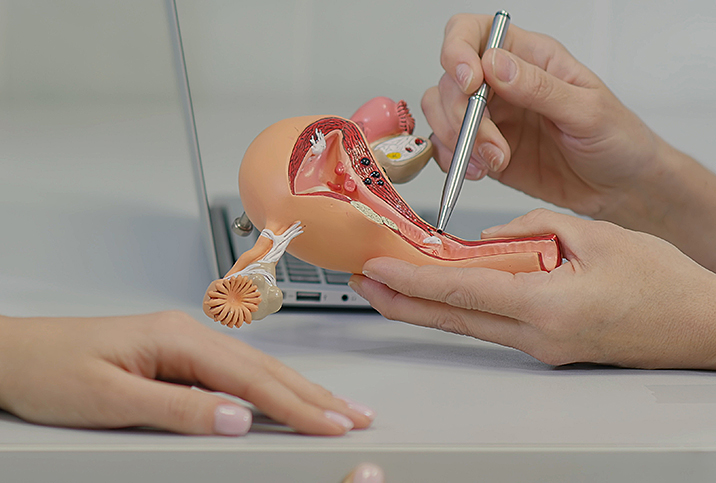What Causes Ovarian Cancer?

Ovarian cancer originates with cellular abnormalities at the end of the fallopian tubes. If mutated cells spread to the ovaries, you may experience signs and symptoms your doctor can identify through pelvic exams, imaging tests and blood screenings.
While there's no surefire way to prevent ovarian cancer, keeping up with doctor's visits and paying attention to the well-known risk factors give you a better chance at potentially lifesaving early detection.
Hormonal risk factors
Epithelial ovarian cancer has known risk factors, but the information doesn't always apply to less-common germ cell tumors or stromal tumors.
Age is a known risk factor for ovarian cancer. Most cases occur after menopause—half of ovarian cancer patients are age 63 or older—so women under age 40 are unlikely to be diagnosed. And women younger than 40 who are diagnosed tend to develop other unusual types of ovarian cancers, not the more common epithelial ovarian cancers. Taking hormone therapy after menopause raises the probability of ovarian cancer, so it's important to discuss this risk factor with your doctor as you weigh the pros and cons of hormone therapy.
Pregnancy history plays a role in ovarian cancer risk, too. Getting pregnant without carrying to term or having your first full-term pregnancy at age 36 or later results in a higher risk of ovarian cancer. Starting to menstruate at an early age or beginning menopause at an older age, or both, can also raise your risk.
Associated genetic mutations
Various genetic mutations are associated with ovarian cancer. If you or a close relative has had breast or pancreatic cancer, you may have genetic mutations in the ATM, BRCA1, BRCA2, BRIP1, RAD51C, RAD51D and PALB2 genes.
Mutations in the MUTYH gene can lead to cancer in the bladder, colon or ovaries due to MUTYH-associated polyposis syndrome. People with Peutz-Jeghers syndrome (caused by mutations in the STK11 gene) are at higher risk of ovarian cancer, as well. As teens, they may develop intestinal or stomach polyps, which can spread to the rest of the digestive tract in adulthood.
Other risks
Experts suspect a person's ovarian cancer risk (particularly for less-aggressive cancer) increases if they are overweight or obese, but that conclusion hasn't been proved. A history of in vitro fertilization (IVF) appears to raise the chances of "low malignant potential" (less-invasive) ovarian tumors.
Research into whether talcum powder raises ovarian cancer risk has mixed findings. Many studies rely on memory and aren't without potential bias, so more investigation is needed before specific recommendations can be made.
Reduce your risk of ovarian cancer
You may reduce your risk of certain types of ovarian cancer if you avoid smoking, maintain a healthy weight and follow a nutritious diet. Women who use birth control pills and intrauterine devices (IUD) or who have their tubes tied have a statistically lower risk, as well. Having a hysterectomy reduces a woman's chances of developing ovarian cancer by one-third.
Talk to your family members about their medical history to better understand your potential genetic risk factors. Your doctor may refer you to a genetic counselor or suggest a prophylactic surgery or medication to protect you against the disease. Living a healthy lifestyle, which includes going to preventive doctor's appointments, can help you detect issues early.
















